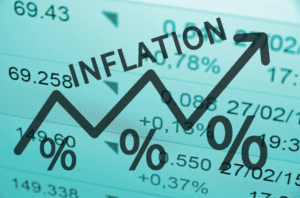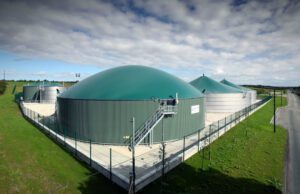
The growth of consumer prices in Ukraine in July 2022 due to seasonal factors slowed down to 0.7% from 3.1% in June and 2.7% in May, returning to the level of the end of last year, the State Statistics Service reported (Gosstat) on Wednesday.
In July last year, inflation was 0.1%, so in annual terms, in July this year, it rose to 22.2% from 21.5% in June and 18% in May.
Core inflation over the past month also fell to 1.2% from 1.6% in June and 1.4% in May. However, taking into account the core deflation of 0.1% in July 2021 in annual terms, it increased to 16.7% from 14.9% in June and 13.7% in May.
Since the beginning of this year, for the first seven months, inflation in Ukraine amounted to 18.2%, and the base – 12.7%, said the State Statistics Service.
In the consumer market in July, prices for food and non-alcoholic beverages rose by 0.8%. Most of all (by 8.7%) the price of eggs rose. Prices for processed cereals, rice, pork, lard, fish and fish products, non-alcoholic drinks, bread and butter increased by 5.1-1.1%. At the same time, prices for fruits, beef and vegetables fell by 5.4–1.9%.
Prices for alcoholic beverages and tobacco products increased by 1.3%, incl. for tobacco products – by 1.8%, alcoholic beverages – by 0.8%.
Clothing and footwear fell in price by 3.5%, including footwear – by 3.8%, clothing – by 3.2%.
Transportation prices decreased by 0.3% mainly due to cheaper fuel and lubricating oils by 4.4%. At the same time, the cost of travel in road passenger transport increased by 2.9%.
In the field of communications, prices increased by 2.1%, which is associated with an increase in the cost of mobile communications by 4.1% and postal services by 2.6%.
As reported, in 2021 inflation in Ukraine rose to 10% from 5% in 2020 and 4.1% in 2019, while core inflation rose to 7.9% against 4.5% a year earlier.
The NBU predicts that inflation will accelerate to 31% this year, including up to 25.6% in the third quarter.

PZU Ukraine Insurance Company (Kyiv) in January-June 2022 collected UAH 558.1 million in gross premiums, which is 27.49% less than in the same period of 2021, reports RA Standard- Rating”, updating the company’s credit/financial stability (reliability) rating on the national scale at the level of “uaААА” based on the results of the specified period.
According to him, income from individuals of the insurer decreased by 13.42% – to UAH 383.578 million, from reinsurers – by 30.40%, to UAH 10.629 million. Thus, the share of individuals in the gross premiums of the insurer amounted to 68.73%, and the share of reinsurers – 1.90%. According to the results of the first half of 2022, individuals continue to dominate the company’s client portfolio.
Insurance payments sent to reinsurers for the first half of 2022 compared to the same period in 2021 decreased by 69.48% to UAH 91.473 million. Thus, the participation rate of reinsurance companies in insurance premiums decreased by 22.55 percentage points. – up to 16.39%.
Net premiums decreased by 0.71% to UAH 466.66 million, earned insurance premiums increased by 20.27% to UAH 525.751 million.
The volume of payments and indemnities made by the insurer for the first half of 2022 amounted to UAH 272.106 million, which is 6.41% higher than the amount of indemnities for the same period in 2021. Thus, the level of payments increased from 33.22% to 48.75%, or by 15.53 p.p.
During the specified period, operating profit of IC PZU Ukraine increased 2.82 times, to UAH 86.301 million, its net profit increased by 93.07%, to UAH 79.753 million.
As of July 1, 2022, the company’s assets decreased by 12.00% – to UAH 2.508 billion, equity increased by 1.69% – to UAH 839.439 million, liabilities decreased by 17.59% – to UAH 1.669 billion, cash and cash equivalents increased by 2.41 times – up to UAH 263.522 million.
Thus, as of the beginning of the third quarter of 2022, the company had a sufficient level of capitalization (50.29%), and 15.79% of its liabilities were covered by cash.
At the same time, it is noted that as of the indicated date, the insurer made financial investments in the amount of UAH 465.179 million, which consisted of government bonds (55.19% of the investment portfolio) and deposits in banks with an investment grade credit rating (44.81% of the portfolio).
According to the report, IC PZU Ukraine has the support of one of the largest insurance groups in Central and Eastern Europe – PZU Group (which includes the parent company PZU S.A., IC PZU Ukraine).

JSC Chernihivgaz, which operates under the brand name of the Regional Gas Company, has issued technical conditions for the connection of the first biomethane plant in Ukraine to the Hals Agro LLC in the Chernihiv region, according to the press release of the RGK.
“The regional gas company ordered the production of gas equipment for the plant at one of the RGC Production plants. The capacity of the first stage of construction, which will be completed by the end of this year, will be 330 cubic meters of biomethane per hour,” the document states.
According to RGK, the first phase of construction of gas networks involves the construction of a gas pipeline 800 m long, which will allow Hals Agro to transfer 330 cubic meters to gas distribution networks (GDM). m of biomethane per hour in winter. It is assumed that the connection will take place by the end of 2022.
“This is the first project to connect a biomethane plant in Ukraine. We are ready to scale this experience in all regions where RGK is present. Our company has technical expertise and access to the technologies of leading manufacturers of gas equipment, as well as the experience of European gas-fired power plant operators who have been working with biomethane for many years “, said Ihor Gotsyk, head of the decarbonization department of RGK, whose words were quoted in the press release.
As the company explained, in the future “Hals Agro” plans to increase the production of biomethane to 1.1 thousand cubic meters. m/h, and RGK and Chernihivgaz specialists will encircle the area of operation of two adjacent gas distribution stations, building another 8 km of gas pipeline.
“Then the biomethane plant will gain access to a larger number of consumers and will transfer biomethane to the network immediately through two timing systems. The work is planned to be completed by the beginning of the heating season of 2023/24,” – informed the RGC.
The design capacity of the installed equipment for cleaning biogas into biomethane is about 3 million cubic meters. m per year, which is enough for the local gas supply of 1,500 private households adjacent to the plant.
According to RGC, the gas regulation equipment and gas metering unit required for connection to the network are already manufactured at one of RGC Production’s modern plants. Nodes and components from leading manufacturers Pietro Fiorentini and Emerson, which have confirmed the quality of their equipment in working with biomethane in Europe and the world, will also be used.
As reported, timing operators operating under the RGK brand have simplified the connection of biomethane plants to gas distribution networks as much as possible and offer this service for UAH 1. Biomethane producers must finance the construction of external and internal gas networks and equipment.
Gas distribution networks in Ukraine are the most acceptable and promising for connecting biomethane plants. They are the most widespread in the territory of the country and have comparable system pressure with biomethane producers, which does not require the installation of additional equipment.
As of the beginning of June 2022, 26 companies that plan to produce a total of 206 million cubic meters have applied to “Operator GTS of Ukraine” LLC (OGTS). m of biomethane per year.
According to the estimates of experts of the Bioenergy Association of Ukraine, the volume of biomethane production in the country may reach 7.8 billion cubic meters. m per year.
BIOMETHANE PLANT, Chernihivgaz, connecting, technical conditions

Despite the significant demand for windows to replace those damaged as a result of the armed aggression of the Russian Federation in Ukraine, their production volume fell three times compared to 2021, Oleksiy Bubnov, executive director of the Association of Window and Facade Market Participants (AUROF), told Interfax-Ukraine .
“According to our data, 150-160 thousand structures were produced in May, 170-180 thousand in June, 220-250 thousand in July. There is a positive trend, but compared to 2021, the volume of window production fell three times,” he said.
At the same time, the expert added that these data do not include the number of double-glazed windows that were produced to replace damaged windows, where the frames themselves survived.
“The industry will be able to operate at full capacity if there is glass and raw materials for the production of profiles. For other components of the window (accessories, components for double-glazed windows), everything is available and in sufficient quantity. And, of course, it will be necessary to select workers, because today all companies work in one shift,” Bubnov said.
Considering the acuteness of the issue of restoring the housing stock in the country, he proposes to consider the issue of granting a deferment from conscription to the Armed Forces of Ukraine for specialists in specialties that are critical for the window industry.
The expert named a number of other problems that need to be solved in order to launch the market at full capacity.
He, in particular, recalled that the only producer of PVC raw materials for the production of profiles, Karpatneftekhim (Kalush), has not been operating since the beginning of the war.
As reported, the Prosecutor General’s Office recently transferred the arrested corporate rights of Karpatneftekhim to the management of ARMA, but there is no information about the timing of the resumption of its work.
“The situation is absurd: national profile producers have to buy raw materials abroad and pay a protective duty of 12% on PVC raw materials, adopted in support of Karpatneftekhim. We propose to cancel it at this stage, at least until it is restored in full production,” says Bubnov.
About 80% of glass before the war was supplied from Russia and Belarus. “Since the beginning of the war, the window industry has refused any trade relations with the aggressor country and its accomplice. There remains the opportunity to buy glass in European countries, in Turkey and Azerbaijan,” he explained.
At the same time, Bubnov said, logistically, such deliveries are possible only by land, by special vehicles, the so-called “jumbos” (for transporting large-format glass), which go empty for loading, but are forced to stand in queues at customs.
The Executive Director of AUROF proposes to provide a simplified procedure – the “green corridor” – for vehicles following the glass on exit from Ukraine and at the entrance to the country.
The risk factor, the expert said, which could slow down the glazing of war-damaged buildings, is the alleged 10% tax on the purchase of foreign currency.
“Today, the cost of windows has increased by 70-80% compared to the pre-war period. Since glass is not produced in Ukraine, the introduction of this tax will automatically lead to an increase in the cost of double-glazed windows and windows. We believe that if a 10% tax on the purchase of foreign currency is introduced, it will should be canceled for contracts under which the currency will be used to purchase glass,” Bubnov believes.
Established in 2013, AUROF unites 29 market participants.
National bank of Ukraine’s official rates as of 15/08/22

Source: National Bank of Ukraine